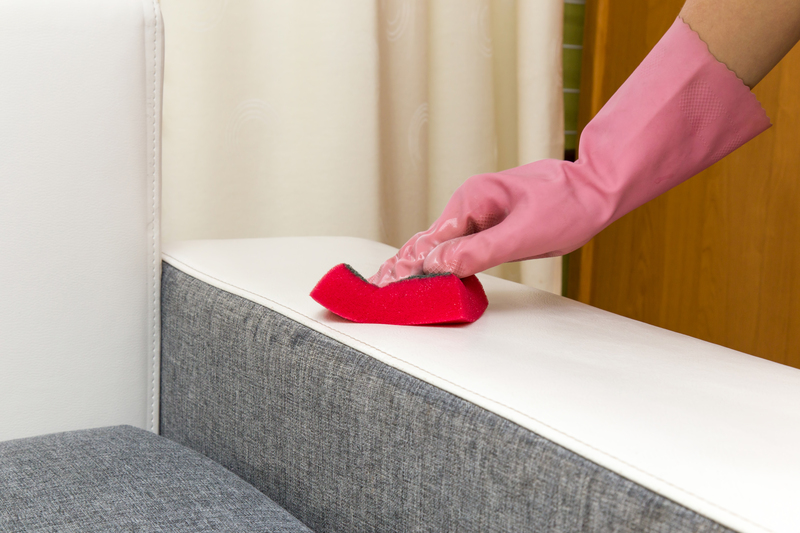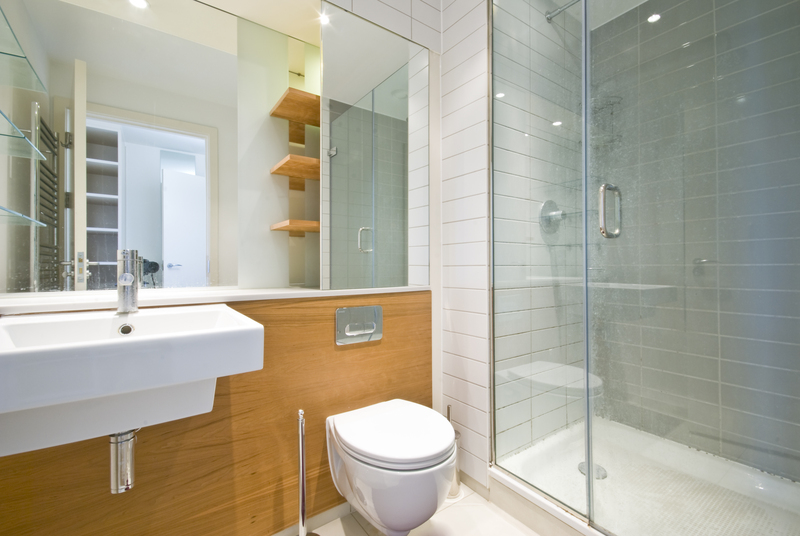The Hidden Benefits of Maintaining Good Air Quality in Homes and Businesses
Posted on 03/07/2025
The Hidden Benefits of Maintaining Good Air Quality in Homes and Businesses
Good air quality is often overlooked in the discussion of wellness and productivity, yet it plays a silent but crucial role in our daily lives. Whether at home or in the workplace, ensuring clean indoor air goes beyond mere comfort. In this comprehensive article, we'll explore the **hidden benefits of maintaining optimal air quality**, and why you should make it a priority for your house or commercial space.
Understanding Indoor Air Quality: More Than Meets the Eye
Indoor air quality (IAQ) refers to the condition of air within and around buildings and structures as it relates to the health and comfort of occupants. Clean and fresh air indoors is essential, not just for easy breathing but for the overall well-being of everyone occupying the space.
- Dust, allergens, and mold spores can lurk invisibly in the air.
- Chemical pollutants like volatile organic compounds (VOCs) from paints, furniture, and cleaning supplies can compromise air safety.
- Inadequate ventilation magnifies the problem, leading to an accumulation of these pollutants indoors.
While most people focus on temperature or aesthetics, keeping high indoor air standards can dramatically transform the health and efficiency of any environment.

Key Benefits of Maintaining High Indoor Air Quality
1. Boosted Physical Health and Immunity
Poor air quality is a silent cause of many health problems, ranging from minor irritations to severe chronic conditions. When airborne pollutants are minimized, the body's immune system faces fewer threats, reducing the risk of respiratory ailments, headaches, allergies, and other health complications.
- Reduced Allergies: Cleaner air means fewer triggers for allergies and asthma. This is especially crucial for children and older adults who are more sensitive to polluted environments.
- Better Sleep: Purified air lowers nighttime breathing difficulties, leading to deeper, more restorative sleep.
- Chronic Disease Prevention: Long-term exposure to poor air quality can contribute to heart disease, lung cancer, and strokes. Maintaining good air standards at home and work can lessen this risk.
2. Enhanced Mental Well-being and Productivity
Recent studies underline the connection between clean indoor air and improved cognitive function. High levels of CO2 or chemical fumes can make us feel sluggish, anxious, or even cause "brain fog."
- Improved Focus: With fewer contaminants, our minds stay sharp and alert, leading to higher concentration and productivity, essential for offices and study spaces.
- Less Stress: Fresh, oxygen-rich air has been shown to lower stress hormones like cortisol, making you feel more relaxed and energized.
- Better decision-making: Studies reveal that employees perform complex tasks better in environments with excellent air quality.
3. Protection of Property and Investments
It's not just people who benefit when you maintain healthy air standards. Your house or business location itself also profits from improved air quality.
- Reduced Mold Growth: Proper ventilation and humidity control hinder the growth of destructive mold and mildew, safeguarding walls, carpets, and furniture.
- Preserved Electronics: Dust and air pollutants shorten the lifespan of computers and gadgets. Cleaner air helps protect your valuable tech assets.
- Structural Longevity: Persistent dampness and chemical contaminants can corrode building materials over time, leading to costly repairs. Good air management ensures your property stands the test of time.
4. Improved Energy Efficiency and Cost Savings
Many are surprised to learn that maintaining air quality can lower expenses in the long run. Efficient HVAC systems work better when filters are regularly cleaned, and ventilation is kept optimal.
- Lower Utility Bills: Clean ducts and vents mean heating and cooling systems require less energy, reducing overall utility costs.
- Fewer Maintenance Costs: Preventative care of air systems lowers the chances of expensive repairs caused by neglect and accumulation of dust or mold.
- Maximized Equipment Lifespan: Both home and office appliances function better in environments free from excessive dust and pollutants.
How Poor Air Quality Negatively Impacts Homes and Workplaces
Understanding the adverse effects of neglecting air standards can motivate us to prioritize indoor air wellness.
- Frequent Illness: Offices with poor air often report higher rates of employee absenteeism due to respiratory infections.
- Lower morale and productivity: Headaches, drowsiness, and irritation are common when ventilation is inadequate.
- Increased cleaning needs: Dust buildup accelerates without proper filtration, making spaces look and feel less inviting.
- Costly repairs: If ignored, mold and condensation can cause invisible yet expensive damage.
Evidence-Based Studies Supporting the Importance of Clean Indoor Air
Recent research has provided concrete evidence of the hidden benefits of air quality improvement in residential and commercial settings.
- A 2021 Harvard study found that improved ventilation in office buildings resulted in a 61% increase in cognitive function scores among workers.
- The EPA notes that Americans, on average, spend nearly 90% of their time indoors, making IAQ crucial for long-term health.
- Children exposed to cleaner air indoors report fewer asthma attacks and better school performance, according to CDC data.
Simple Steps to Achieve and Maintain Good Indoor Air Quality
Improving indoor air doesn't need to be complex or costly. Consistency and regular upkeep are key to enjoying the advantages of optimal air in your living or working areas.
At Home
- Regularly clean and dust: Vacuum frequently and wash bedding and drapes to minimize dust mites and allergens.
- Open windows: When possible, promote natural airflow to help push out stale indoor air and bring in fresh oxygen.
- Invest in air purifiers: HEPA-fitted devices can trap fine particles, including pollen and pet dander.
- Avoid smoking indoors: Tobacco smoke contains thousands of harmful chemicals that significantly degrade air quality.
- Monitor humidity levels: Aim for 30-50% humidity to prevent mold growth.
In Businesses and Offices
- Schedule routine HVAC maintenance: Clean or replace filters every 1-3 months, depending on usage and local air conditions.
- Install carbon dioxide detectors: High CO2 levels affect mental clarity and should be swiftly addressed.
- Encourage green practices: Use VOC-free cleaning agents and promote the use of indoor plants that naturally purify the air.
- Monitor for mold or leaks: Regular building inspections help catch issues before they escalate.
- Educate employees: Awareness about air quality protocols can lead to better collective cooperation and results.
The Hidden Psychological Benefits of Maintaining Clean Air
Beyond the physical, the psychological advantages of improved air should not be underestimated.
- Enhanced Mood: Clean, fresh air inspires a more positive outlook and reduces symptoms of depression and anxiety.
- Increased Motivation: Environments free from musty odors and stale air empower people to be more active and engaged.
- Stronger Social Connections: Fresh and inviting spaces foster better interactions among family, friends, and colleagues.
Mental clarity and emotional wellness flourish when occupants are comfortable and not distracted by odors, stuffiness, or allergy symptoms.
Air Quality and Sleep: The Overlooked Connection
Quality of sleep is directly linked to the quality of air in our surroundings. Studies reveal that:
- Lower air pollution levels during the night are associated with higher sleep efficiency.
- Cleaner air minimizes the likelihood of snoring, coughing, or waking up due to dry, itchy throats.
- Improved sleep patterns lead to better daytime alertness, mood, and overall productivity.
This is one of the lesser-known but significant **invisible advantages of maintaining indoor air quality** at home and work.

Final Thoughts: The Investment That Pays Off
Prioritizing good air quality is one of the most cost-effective ways to boost health, comfort, and efficiency in both homes and businesses. It's an investment that pays dividends through better health, fewer sick days, increased property value, and an overall better quality of life.
- Start with small steps: Open windows, swap out filters, and add plants.
- Be proactive: Schedule regular maintenance and stay informed about air safety updates.
- Encourage a culture of cleanliness and air awareness at home and work for maximum collective benefit.
Ultimately, the hidden benefits of maintaining healthy air quality are too substantial to ignore, especially in a world where indoor living is the norm. By being mindful and proactive, every home and business can become a sanctuary of health, productivity, and well-being.
Frequently Asked Questions About Maintaining Indoor Air Quality
What are the most common signs of poor indoor air quality?
- Frequent sneezing, coughing, or allergy flare-ups among residents or workers.
- Persistent musty or chemical odors.
- Visible mold growth or excessive dust accumulation.
- Unexplained headaches or fatigue.
How often should I replace air filters in my HVAC system?
For most homes and offices, change filters every 1-3 months. If you have pets, allergies, or live in a high-pollution area, check and replace them more frequently.
Can houseplants truly improve indoor air quality?
While houseplants like spider plants and peace lilies can absorb some toxins, their effect is modest compared to mechanical air cleaners. However, they contribute to a healthier, more pleasant atmosphere and can supplement other air-purifying measures.
What professional services can help with indoor air quality?
- HVAC cleaning and inspection services.
- Indoor air quality assessments by certified experts.
- Mold remediation and leak-detection services.
For ultimate results, combine professional help with regular homeowner or business-owner vigilance for the best indoor air quality and its ongoing benefits.
Let the fresh air in--your mind, body, and property will thank you.




